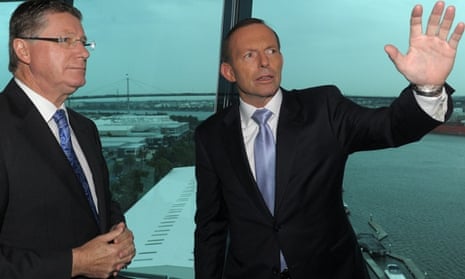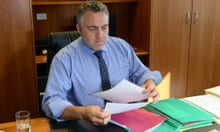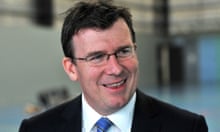The budget’s centrepiece – one thing the government IS actually spending money on – is a multi-billion-dollar infrastructure plan. The government argues that building things, primarily roads, increases productivity and economic growth. It also helps fulfil Tony Abbott’s desire to go down in history as the “infrastructure prime minister”, rather than, say, the prime minister who broke even more promises than any who preceded him.
But given how the government is approaching the task, the rationale for this spending doesn’t necessarily stack up.
Most expert opinion says infrastructure can boost productivity to some extent, if it is the right infrastructure in the right place, and if it is subject to the most rigorous cost-benefit analysis before it is announced by a politician in a hard hat. If that doesn’t happen, infrastructure spending can end up being an enormous waste of money. Oh dear.
The chairman of the Productivity Commission, Peter Harris – who would seem to be an appropriate person to listen to on this point – was very blunt with his advice in a speech on Friday, targeting the federal government’s intention to set aside a huge honeypot, reportedly as much as $5bn, as top-up funding for states that sell big assets such as power generators or ports and then very quickly reinvest the money in infrastructure.
“Project plans are being dusted off all over Australia in the face of the new incentives for recycling capital from privatisation. We should all hope that there is more than dust being brushed off. But right now we can only hope,” he said. Quite blunt, really (for a Productivity Commission guy).
He said governments should instead be dusting down their flawed processes for deciding what projects to fund, with cost-benefit analyses done and published before announcements or election promises were made, or ribbons cut.
He also pointed out that this hasn’t been happening for some time.
“The norm in major projects is that the announcement precedes the detailed planning. Then if there is time a cost-benefit assessment may be done, but often won’t be published due to confidentiality concerns. Following that, there is a rapid move to tender in order that the promise is not overtaken by the appearance of delay.”
The Productivity Commission’s draft report in March to the Abbott government said the way things had been done in the past has resulted in “poor value for money”.
“There are many examples in Australia of poor project selection leading to highly inefficient outcomes. In such cases, investment in public infrastructure is a drain on the economy and tends to lower productivity and crowd out more efficient projects,” that report said.
In other words, if you do the press release first and the business case later, it can totally backfire, and potentially have exactly the opposite economic impact to the one the government is seeking.
And here’s the rub. That’s exactly what the Abbott government has done. It has pledged billions of dollars to projects before any business case had been done and is giving some of them even more money in this budget, again without a business case.
Pledging there would be “cranes over our cities” within a year of his election, Abbott make election promises totalling $3bn to the $10bn West Connex toll road in Sydney and the first stage of the East West link road in Melbourne – at a time when neither had business plans, and when Infrastructure Australia, which is supposedly the independent arbiter of the nation’s infrastructure priorities, said neither was “ready to proceed”.
Documents recently released to the NSW parliament show the full business case for West Connex is still not complete, although very detailed work has been done on the public relations strategy.
But West Connex is set to get an additional $2bn as a concessional loan in Tuesday’s budget, to “speed up” its construction.
Doing precisely what Harris says politicians should not do, Abbott and the Victorian premier, Denis Napthine, have already announced that the commonwealth will be chipping in an additional $1.5bn to the second stage of the East West link.
Abbott said the commonwealth's contribution depended on the Victorian government providing a business case for the second stage, but he was “confident it is a worthwhile investment”. He didn’t say how he could be so confident without a business case, or how likely it was he’d take back the cash if it didn’t pass muster. Presumably, not very.
Added to this is the commonwealth’s insistence it will “stick to its knitting” and fund only roads – leaving the states “free” to fund public transport. What has actually happened in most states is a dramatic scaling back of public transport plans in favour of the road projects that will attract the federal cash.
But again, most experts say that the only way to ease traffic congestion is to spend money on both roads and public transport.
All this raises questions about whether the massive road spend will achieve the government’s intentions.
And in the meantime – in order to finance all this bitumen and also keep the budget bottom line heading in the right direction – personal tax and fuel tax will rise, and spending on Medicare, schools, higher education, pensions and unemployment benefits are likely to be cut.
Abbott is convinced of the voter, as well as economic, appeal of road funding. He wrote in his book, Battlelines, that even the "humblest person is king in his own car".
Some folk may indeed feel that way. But they could well value the things they’ll be losing on Tuesday much more.




Comments (…)
Sign in or create your Guardian account to join the discussion